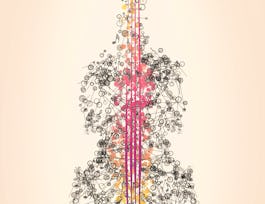The course will explore the tone combinations that humans consider consonant or dissonant, the scales we use, and the emotions music elicits, all of which provide a rich set of data for exploring music and auditory aesthetics in a biological framework. Analyses of speech and musical databases are consistent with the idea that the chromatic scale (the set of tones used by humans to create music), consonance and dissonance, worldwide preferences for a few dozen scales from the billions that are possible, and the emotions elicited by music in different cultures all stem from the relative similarity of musical tonalities and the characteristics of voiced (tonal) speech. Like the phenomenology of visual perception, these aspects of auditory perception appear to have arisen from the need to contend with sensory stimuli that are inherently unable to specify their physical sources, leading to the evolution of a common strategy to deal with this fundamental challenge.


Music as Biology: What We Like to Hear and Why
Taught in English
Some content may not be translated
64,971 already enrolled
(678 reviews)
Skills you'll gain
Details to know

Add to your LinkedIn profile
7 quizzes
See how employees at top companies are mastering in-demand skills


Earn a career certificate
Add this credential to your LinkedIn profile, resume, or CV
Share it on social media and in your performance review

There are 8 modules in this course
Introduction to Music as Biology
What's included
1 video1 reading1 discussion prompt
An overview of the organization of the human auditory system, and how sound signals are transformed into sound stimuli.
What's included
4 videos2 readings1 quiz4 discussion prompts
An introduction to the sound qualities we perceive, and how and why these qualities differ from the information in sound signals.
What's included
5 videos1 reading1 quiz2 discussion prompts
A discussion of the nature of vocal sound signals, their biological importance and their role in understanding music.
What's included
5 videos1 reading1 quiz3 discussion prompts
The tonal phenomena that need to be explained in any theory of music, and different approaches that have been take to provide answers.
What's included
9 videos1 reading1 quiz3 discussion prompts
Why a small number of basic scales are used in music worldwide, and how a biological framework explains this and related puzzles.
What's included
6 videos1 reading1 quiz3 discussion prompts
How emotion is conveyed by vocal similarity in music across cultures, and how the speech of a culture and its music are related. A summing up of the major points in the course follows.
What's included
7 videos3 readings2 quizzes4 discussion prompts
Additional demonstrations and commentaries by Ruby Froom on some of the musical issues considered in the course, as well as a glossary of terms and bibliography for references.
What's included
6 videos16 readings
Instructor

Offered by
Recommended if you're interested in Basic Science

West Virginia University

The Hong Kong University of Science and Technology

University of Colorado Boulder

University of Rochester
Why people choose Coursera for their career




Learner reviews
Showing 3 of 678
678 reviews
- 5 stars
57.22%
- 4 stars
24.92%
- 3 stars
12.24%
- 2 stars
3.53%
- 1 star
2.06%
New to Basic Science? Start here.

Open new doors with Coursera Plus
Unlimited access to 7,000+ world-class courses, hands-on projects, and job-ready certificate programs - all included in your subscription
Advance your career with an online degree
Earn a degree from world-class universities - 100% online
Join over 3,400 global companies that choose Coursera for Business
Upskill your employees to excel in the digital economy
Frequently asked questions
No. Completion of a Coursera course does not earn you academic credit from Duke; therefore, Duke is not able to provide you with a university transcript. However, your electronic Certificate will be added to your Accomplishments page - from there, you can print your Certificate or add it to your LinkedIn profile.
Access to lectures and assignments depends on your type of enrollment. If you take a course in audit mode, you will be able to see most course materials for free. To access graded assignments and to earn a Certificate, you will need to purchase the Certificate experience, during or after your audit. If you don't see the audit option:
The course may not offer an audit option. You can try a Free Trial instead, or apply for Financial Aid.
The course may offer 'Full Course, No Certificate' instead. This option lets you see all course materials, submit required assessments, and get a final grade. This also means that you will not be able to purchase a Certificate experience.
When you purchase a Certificate you get access to all course materials, including graded assignments. Upon completing the course, your electronic Certificate will be added to your Accomplishments page - from there, you can print your Certificate or add it to your LinkedIn profile. If you only want to read and view the course content, you can audit the course for free.


